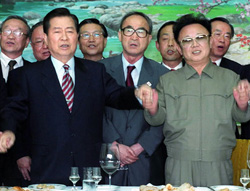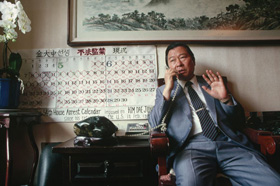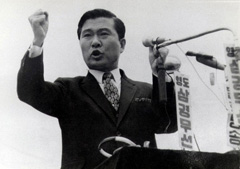Kim Dae-jung: a death that led to dialogue
By Ramiro Trost *
The two Summit meetings between both Koreas left more doubts than certainties. Lee Myung-bak’s inauguration in the South deepened that sensation and froze the reconciliation process. Paradoxically, the death of who was its artificer in June, 2000 has opened the way to new talks between North and South.
 By making that 2000 gathering possible, Kim Dae-jung opened a whole new relationship type with North Korea when persuaded to meet Kim Jong-il. It was the first inter-Korean summit ever. Roh Moo-hyun, the next South Korean President, would follow that exchanges path and also met Kim.
By making that 2000 gathering possible, Kim Dae-jung opened a whole new relationship type with North Korea when persuaded to meet Kim Jong-il. It was the first inter-Korean summit ever. Roh Moo-hyun, the next South Korean President, would follow that exchanges path and also met Kim.
The joint declarations that were produced right after those get-togethers were a myriad of good intentions but lacked the feasibility factor. They left answered questions until today.
Should the two Koreas continue its way to reconciliation and reunification before reaching a solution to the nuclear issue? Could they cohabit, invest, visit and rediscover each other knowing that there is a nuclear threat hanging over their heads? Could reunification happen without a previous reconciliation?
It is the same approach/spacing out game that plays North Korea when negotiating its nuclear strategy. Former US President, George W. Bush, never knew how to deal with this specific nuclear dilemma. Pyongyang did not allow him to even touch the ball. Kim Jong Il set the negotiations pace thanks to threats, missile launches and even a nuclear test.
 The panorama seems to have changed with Barak Obama’s arrival to Washington. In this Democratic-party context, ex US President Bill Clinton flew to Pyongyang to meet the North Korea leader. Kim’s permission to free the Asian-American journalists is a sign of this modification.
The panorama seems to have changed with Barak Obama’s arrival to Washington. In this Democratic-party context, ex US President Bill Clinton flew to Pyongyang to meet the North Korea leader. Kim’s permission to free the Asian-American journalists is a sign of this modification.
However, meanwhile the political channel is reactivated mostly with humanitarian accomplishments such as the mentioned freed journalists and the North/South families’ reunion no one can deny that a big deal of those inter-Korean agreements is based upon economic cooperation.
The Hyundai Economics Research Institute revealed that South Korea will need at least 11,000 million dollars to carry out the projects expected by North Korea. Only in humanitarian aid the South delivered more than 2,200 million dollars in the last 14 years.
The main concern relies on whether the South Koreans are willing to pay more taxes to support a regime that represents an actual threat to them. There are sectors that believe that help will not reach the North Korean people; instead it will finance the rival government. Those doubts were growing when the recently deceased ex President Roh Moo Hyun finalized his term: part of the South Korean electorate expressed concerns regarding the approach to the North policy started by Kim Dae Jung. That is why it did not surprise anyone when Lee Myung Bak stopped the economic cooperation, the field that North Korea needs to solve the most.
Meanwhile the North intends reestablishing its diplomatic ties with the United States, a similar path seems to initiate between North and South right after Kim Dae-jung’s passing away. The State funerals held to honor the 2000 Nobel Peace Prize laureate brought to Seoul a delegation from Pyongyang that met the President Lee Myung-bak. Conservative Lee’s policy showed a radical change from the beginning of his administration in the way to deal with the North. It even meant a regression in the traveled distance that both countries performed.
 Recently, South Korean public opinion concluded that ex President Roh, who committed suicide two months ago annoyed by corruption suspicions thrown –paradoxically- from the ruling party, had done the trip to the North more like a personal wish rather than to reach certain goals for the neighbors reconciliation.
Recently, South Korean public opinion concluded that ex President Roh, who committed suicide two months ago annoyed by corruption suspicions thrown –paradoxically- from the ruling party, had done the trip to the North more like a personal wish rather than to reach certain goals for the neighbors reconciliation.
Something that favors the current South Korean administration policy to the North is the urgency for foreign currency that the North has and, internally, the fact that the security threat became a daily ordinary phenomenon to most South Koreans, especially to the youth. Beyond the policy change towards the North, President Lee Myung-bak has to deal with Kim Dae-jung’s legacy and with what Roh Moo-hyun has obtained from that point. From progressiveness to conservativeness, moreover temporary freezing measures, there is a walked passed that cannot be erased.
Not only Kim Dae-jung has left a life dedicated to fight for democracy but also his tread will remain as a new approach to deal with North Korea and in the way to search for reconciliation.




